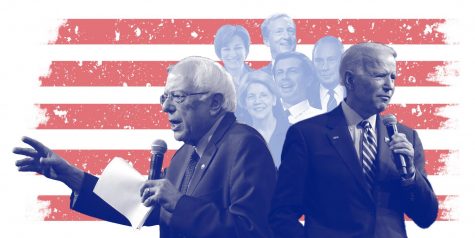Pinky promises and the golden boy: Buttigieg, Warren exit presidential race
March 6, 2020

America will not have a female president or an openly gay president for at least another four years now that Sen. Elizabeth Warren (D-Mass.) and former South Bend, Indiana, Mayor Pete Buttigieg have dropped out of the race.
Elizabeth Warren
Anne Marie Mitchell, an associate professor in the Communication Department, said she was heartbroken for Warren’s supporters and the country when the news broke.
“She gave so many people a vision of what a hardworking, thoughtful woman leader could look like, and she gave a lot of young girls in this country an idea that they can do anything, and that’s what we need,” Mitchell said.
Following major losses in the Super Tuesday elections, Warren announced she was ending her bid for office Thursday, March 5. With more than a dozen states casting their ballots, Warren acquired 64 delegates compared to former Vice President Joe Biden’s 664 delegates and Sen. Bernie Sanders’ (I-Vt.) 573 delegates, as of press time.
Mitchell, who once volunteered for Warren’s campaign, said she felt a lot of positivity and hope between Warren’s pinky promises with Girl Scouts and her committed relationship with an “intelligent” community of supporters.
“This is just the beginning. She’s 70, but she acts ageless and there’s so much that she’s going to bring,” Mitchell said. “It shows girls in this country that a woman is eventually going to be president.”
Freshman public relations major Anna Busalacchi organized a group on campus to support Warren and increase political engagement on campus. She was distraught and teared up when she heard of Warren’s exit from the race.
“She was a hero to all women across the board, showing that women are strong and they can be in these leadership positions and they can debunk those leaders that are abusing their power,” Busalacchi said.
Jason Seawright, a professor of political science at Northwestern University, said although Warren had a strong voting record and significant achievements, she struggled to connect people to her Medicare for All vision and turn her polling numbers into votes.
Sexism “definitely” played a role in Warren’s unsuccessful run, he added.
“There are voters who have higher expectations for women than for men,” Seawright said. “Although women tend to win about as often as men in the U.S., women who run for office are usually more qualified than the men they run against.”
Pete Buttigieg
Buttigieg dropped out of the race Sunday, March 1 following a thorough defeat in the South Carolina primary and endorsed Biden soon thereafter.
Businessman Tom Steyer and Sen. Amy Klobuchar (D-Minn.) also dropped out of the race following South Carolina’s primary, with Klobuchar also endorsing Biden, while former New York Mayor Michael Bloomberg dropped out after Super Tuesday. He, too, has endorsed Biden.
Although Buttigieg performed well in the Iowa caucuses and New Hampshire primary, he consistently struggled with a lack of resources and an inability to appeal to black and Latinx voters.
A November 2019 Quinnipiac University poll found Buttigieg had support from less than 1% of black voters in South Carolina while Biden carried more than 60% of the black vote.
Junior cinema art and science major Devon MacNerland said Buttigieg’s “tricky past” with the black community could have stemmed from when he fired a black police chief as mayor in 2012, along with the general pattern of racial profiling and racism within South Bend’s police force.
“The black vote is … unbelievably important to the elections, in general,” said MacNerland, who is originally from Los Angeles. “That is one of the most highly-contested votes in the country.”
Junior graphic design major Michelle Lee and senior marketing major Therese Niedbala were both surprised by the news of Buttigieg’s departure.
Niedbala said Buttigieg’s presidency would have been historic because he would have been “the first openly gay president … [who] would have spoken a lot for how the American government can better represent people.”
Lee, a Christian Republican who supported businessman Andrew Yang before he dropped out on Tuesday, Feb. 11, said she would have voted for Buttigieg in the general election if he had won the nomination because of his “less extreme nature” and ability to “play the field.”
“He seemed like he was the golden boy,” Lee said. “He could have won, because he had all the right credentials. He’s young, he’s charismatic, he has military background, he’s a very strong leader.”
Buttigieg’s more moderate stances were not popular among all Columbia students, though.
Junior comedy writing and performance major Jack Garrett, a self-ascribed single-issue voter, said he prefers Sanders and his liberal policies.
“I mean, [Buttigieg] is a Republican. He’s not progressive at all. He’s pro-war and not pro-what I like,” Garrett said. “I’m not convinced he even had the gay vote. It didn’t seem like a crucial thing to his candidacy. He didn’t run on any particularly pro-LGBTQ platform.”
According to a Fox News voter analysis, only 22% of LGBT caucus voters in Iowa favored Buttigieg. Forty-two percent said they would vote for Sanders.
Dick Simpson, a professor of political science at the University of Illinois at Chicago and former alderperson, said it was wise of Buttigieg to get out while he could still have some effect on the final outcome, even if his candidacy was emblematic of a larger movement.
“Like Lori Lightfoot here in Chicago, it shows that being gay does not disqualify you from running for high office,” Simpson said. “More and more gay candidates are winning elections at all levels, and it shows that even the presidency isn’t impossible.”







